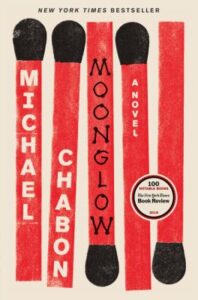 This is, at one and the same time, a work of fiction and the author’s actual family history, selectively combined and embellished. It is the story of Michael Chabon’s grandfather and grandmother, recreated as a totally engaging novel, covering more than five decades in Germany, Philadelphia, Baltimore, New York City, Florida and California. He “recreates” these two antecedents, beginning with his grandfather’s work with the Office of Strategic Services (O.S.S.) in Germany in the waning day of World War II, followed by the meeting with his grandmother in Baltimore two years later, and then their fractured lives thereafter.
This is, at one and the same time, a work of fiction and the author’s actual family history, selectively combined and embellished. It is the story of Michael Chabon’s grandfather and grandmother, recreated as a totally engaging novel, covering more than five decades in Germany, Philadelphia, Baltimore, New York City, Florida and California. He “recreates” these two antecedents, beginning with his grandfather’s work with the Office of Strategic Services (O.S.S.) in Germany in the waning day of World War II, followed by the meeting with his grandmother in Baltimore two years later, and then their fractured lives thereafter.
The key lies in Chabon’s candid Author’s Note: “In preparing this memoir, I have stuck to the facts except when facts refused to conform with memory, narrative purpose, or the truth as I prefer to understand it.” He went on later: “To claim or represent that I retain an exact or even approximate recollection of what anyone said so long ago would be to commit the memoirist’s great sin.” And so his imagination is unleashed …
This is a history, or really even slightly connected stories about his grandparents and their lives in these United States, as they allowed their interconnected emotions to respond to ever-changing stimuli. As Chabon confesses, perhaps there is nothing such as a defined “self”: “Maybe ‘self’ was a free variable with no bounded value.”
Chabon is rich with descriptive phrases. (1) a priest’s cassock: “White dust patterned the black cassock in big splotches like continents or the spots on a cow.”
(2) “The small room was all cross-hatchings of shadow like a lesson in shading a sphere, an arc of darkness wrapped around a circle of gray with a bright spot a bit off-center. The bright spot was my grandmother; all the light in the sad little room seemed to be radiating from her.”
And describing his father reminded me of John le Carre’s father: ” … my big-talking, sweet-talking, fast-talking father was in and out of courtrooms, tax dodges, marriages, and my life … ” And as Chabon concludes, “That was only human, the common lot. But once your dream revealed itself, like most dreams, to be nothing but a current of raw compulsion flowing through a circuitry of delusion and lies, then that was the time to give it up.” His grandfather’s was with Wernher von Braun and space exploration.
Finally, a curious note. The chapter heads are safety matches formed into roman numerals. But two matches are lit, one in Chapter XX describing an O.S.S. excursion, and the other heading Chapter XXV, when his grandfather heads off to jail. The connection: I do not know.
A rich and completely engrossing story!
Editor’s Note: ‘Moonglow’ by Michael Chabon was published by HarperCollins, New York 2016.

Felix Kloman
About the Author: Felix Kloman is a sailor, rower, husband, father, grandfather, retired management consultant and, above all, a curious reader and writer. He’s explored how we as human beings and organizations respond to ever-present uncertainty in two books, ‘Mumpsimus Revisited’ (2005) and ‘The Fantods of Risk’ (2008). A 20-year-resident of Lyme, he now writes book reviews, mostly of non-fiction that explores our minds, our behavior, our politics and our history. But he does throw in a novel here and there. For more than 50 years, he’s put together the 17 syllables that comprise haiku, the traditional Japanese poetry, and now serves as the self-appointed “poet laureate” of Ashlawn Farms Coffee. His wife, Ann, is also a writer, but of mystery novels, all of which begin in a bubbling village in midcoast Maine, strangely reminiscent of the town she and her husband visit every summer.
Actually chapters 11 and 25… have flames. Chapter 11 starts the fire in grandfather. Chapter 25 sets him off to prison a rocket and a murder